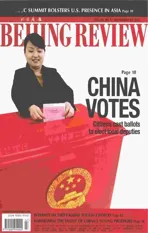GRASSROOTS ELECTIONS IN FULL SWING
2011-10-14ByTANGYUANKAI
By TANG YUANKAI
GRASSROOTS ELECTIONS IN FULL SWING
By TANG YUANKAI
Millions of voters have or are about to cast ballots to elect local lawmakers
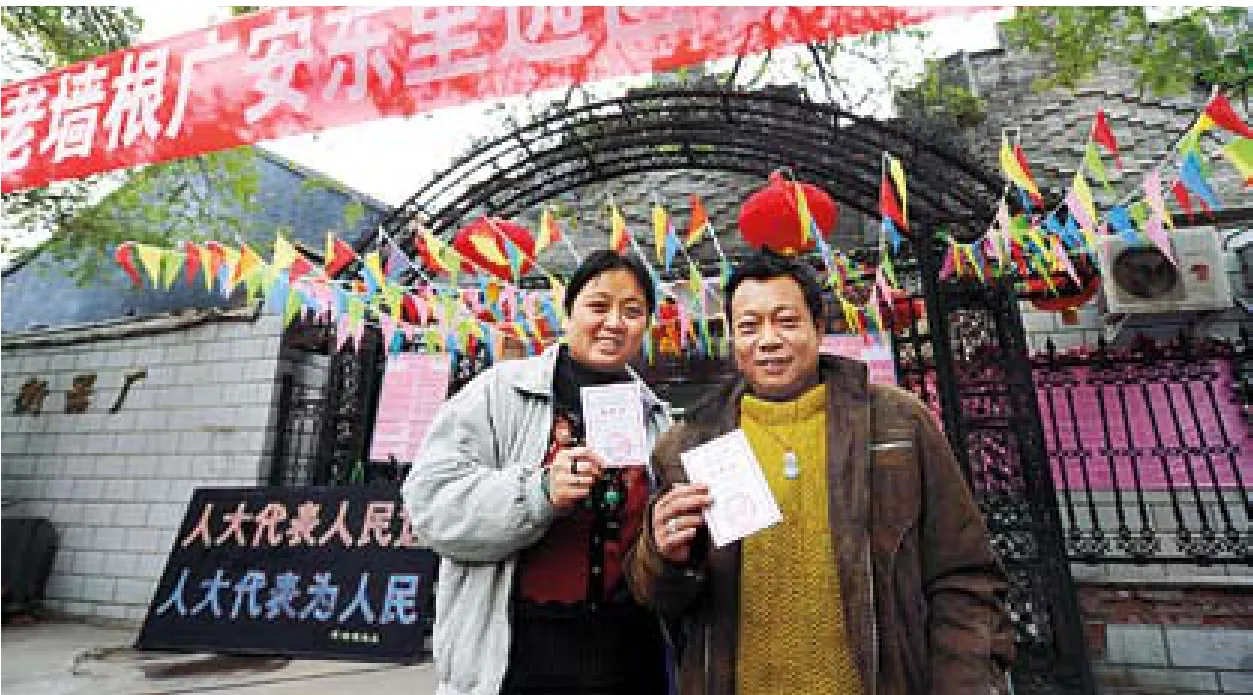
LUO XIAOGUANG
Liu Zihan, a high school senior in Beijing celebrated his 18th birthday on November 8 in a special way. His birthday coincided with elections to lawmaking people’s congresses in Beijing’s districts, counties and townships and Liu cast the frst ballot of his life at a polling station in the Financial Street No.5 Constituency in Xicheng District.
“I didn’t expect to be able to exercise my right to vote on the first day I became eligible,” Liu said.
China’s Constitution and Electoral Law stipulate that any Chinese citizen over 18 years old has the right to vote and be elected, regardless of ethnic origin, race, gender, occupation, family background, religion, education, wealth and length of residence, except for those deprived of political rights according to law.
Elections of people’s congresses at different levels are held once every five years. Official statistics show that on November 8, nearly 9 million voters in Beijing went to polls.
According to the Constitution, deputies to the people’s congresses of counties (including cities without districts and districts directly under cities) and townships are elected directly by the people, while deputies to the National People’s Congress (NPC), China’s top legislature, and provincial-level people’s congresses are elected by people’s congresses at a lower level.
The ongoing elections of county- and township-level people’s congresses are expected to be completed by the end of next year and so far, elections have been held in China’s 26 provinces, autonomous regions and municipalities.
“More than 900 million voters at the county level and more than 600 million voters at the township level will elect more than 2 million lawmakers of more than 2,000 counties and 30,000 plus townships,” said He Yihui, Vice Secretary General of the NPC Standing Committee.
Voter registration
In March 2010, the amended Electoral Law of China went into force.
The new Electoral Law differs from the previous legislation as it grants equal representation in legislative bodies to rural and urban residents. Previously, each rural people’s congress deputy represented four times as many people as an urban deputy.
“The situations in those provinces, autonomous regions and municipalities where the elections are about to conclude indicate that the Electoral Law has been implemented well, and people’s rights to information, par-ticipation, expression and supervision have been respected and their voting rights have been guaranteed,” He said.
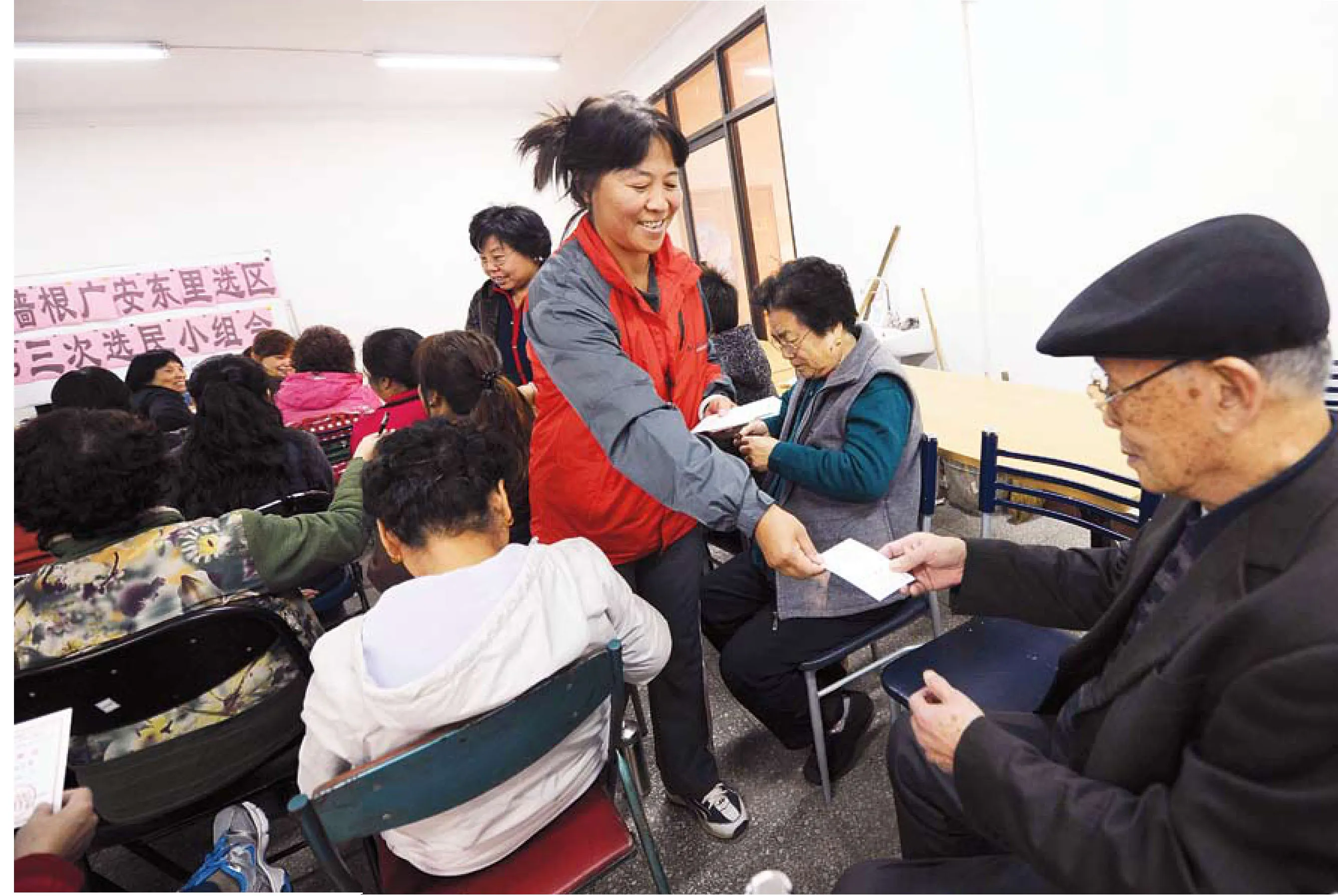
XIAOGUANG
According to the law, voters must register with their constituencies, and election committees will verify their eligibility and issue them voting certifcates. A citizen can choose to vote in the constituency where he or she resides or works.
“To make sure that voters are registered correctly, without being left out or double counted, election committees not only wait for voters to register with them, but also visit communities and work places to register voters. They set up registration stations and use diversified channels such as TV, radio and the Internet to encourage voters to register,” said a spokesman of the Legal Affairs Commission of the NPC Standing Committee.
Volunteers have been trained and dispatched to register voters.
“Initially I worried that people would not open their doors for me, but things turned out better than I expected,” said Xu Na, a college student volunteering at Gaobeidian Township in Beijing’s Chaoyang District.
Xu went from door to door to register voters. “A dozen or so young people who were hesitant about registering at first called me back soon after my visit to register,” Xu said.
One of the principal difficulties of the election process is registering migrant workers. Beijing has a foating population of more than 10 million and China as a whole has more than 260 million migrants. Efforts have been made to guarantee their rights to vote and be elected.
Migrants living away from their hometowns can vote in their current place of residence after obtaining authorization from localities of their registered permanent residency. Election committees can help migrant voters contact their hometown constituencies to verify their eligibility. Migrants who voted from their current residences in previous elections can continue to do so without having to verify their eligibility once again.
Candidate nomination
According to the Electoral Law, preliminary candidates to people’s congress deputies can be nominated, separately or jointly, by political parties and social groups (people’s organizations) such as labor unions, women’s federations and the Communist Youth League. Any group of 10 or more voters can also nominate a candidate.
There is no limit to the number of preliminary candidates. After preliminary candidates are nominated, voters in the relevant constituencies select fnal candidates.

FACE TO FACE: Wang Yujuan answers questions from voters in the Bajiao No.3 Constituency on November 2
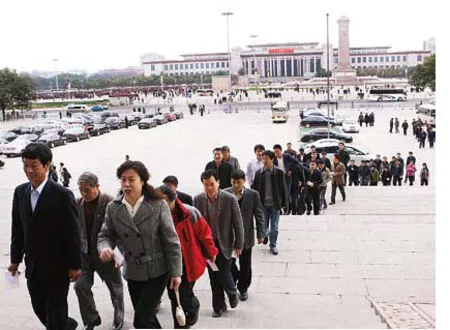
EXERCISING RIGHT: Voters in the Zhongnanhai Constituency walk into the Great Hall of the People to cast their ballots on November 8
For example, the Suzhou Community Constituency in Beijing’s Dongcheng District has 3,263 voters. Seven preliminary candidates were nominated, but only three of them would be put on the shortlist according to election rules.
The selection of the final candidates was based on group discussions organized by the election committee. After the discussions, two preliminary candidates withdrew because they represented the same organizations as other preliminary candidates.
Then in late October, residents’ representatives held a meeting to select three fnal candidates from the remaining fve preliminary candidates.
The preliminary candidates did not attend the meeting, rather each candidate was represented by a colleague who served as a presenter. The presenters briefed the residents’ representatives on the preliminary candidates’ achievements and their reasons for running in the election.
After the presentations, the residents’ representatives voted through a show of hands. The winners were announced after a hand count.
According to the Beijing County- and Township-Level People’s Congress Election Office, 6,615 candidates were nominated from 2,257 constituencies. Among them, 10.9 percent were nominated by political parties or social groups, while the remaining 89.1 percent of candidates were nominated as they were endorsed by more than 10 voters.
Across the city, 37 percent of the candidates were women, and 6.6 percent were from ethnic minorities.
Direct interactions
On the afternoon of November 2, less than a week before the polling day, the community service center of the North Bajiao Community in west Beijing’s Shijingshan District was packed. Candidates for deputies to the Shijingshan District People’s Congress from the Bajiao No.3 Constituency were having a face-to-face meeting with voters.
Present at the meeting were local voters. Chinese and foreign reporters and several residents of other districts in the city attended as observers.
A retired teacher who declined to give his name said that in the past, voters and candidates did not have chance to meet each other.“Voters, knowing only the candidates’ name and basic personal information, cast ballots more or less at random,” he said.
The Electoral Law in force since March 2010 states that if voters request to meet candidates, the election committee should organize such meetings so that candidates can introduce themselves and answer voters’questions.
At 9:30 a.m., the four candidates from the Bajiao No.3 Constituency made a group appearance. After introducing themselves and their plans in succession, they answered voters’ questions.
One candidate, Wang Yujuan, works at the North Bajiao Community’s administrative offce and has served for fve consecutive terms at the Shijingshan District People’s Congress. After retiring from the post of the deputy head of the Bureau of Culture of Shijingshan District, she has devoted 10 years to community work.
“Our community is quite dirty. If you win, what are you going to do about this?” an old man who volunteered to patrol the community asked Wang.
Wang said, “I know the community is old and not managed by any property management company, so it is up to the community’s administrative office and all the residents to improve the sanitary conditions. If I was elected, I would change the community’s environment within fve years.”
Wang’s plan includes training cleaners, improving the community’s infrastructure and mobilizing residents to clean up the community on weekends.
In Wang’s previous terms as a deputy to the district people’s congress, she called attention to the poor road conditions and bad sanitary conditions near the Shijingshan Experiment Primary School. The road was later repaired and the school’s vicinity was cleaned up. Local residents commended Wang’s work.
After answering questions, Wang made public her contact details and asked voters to call and e-mail her with their queries and concerns.
“The face-to-face meetings are good as they help us gain a better understanding of candidates,” said Zhao Jing, a 76-year-old resident.
On the same day, another face-to-face meeting was held in a constituency in Haidian District, which is home to 10 of Beijing’s most prestigious universities. Three fnal candidates in this constituency were in their early 20s, including Gao Jian, a doctoral candidate at the School of Traffc and Transportation of Beijing Jiaotong University.
At the meeting, Gao was asked if he was prepared to speak on sensitive social issues? Gao said, “Sure. Either as a student or a people’s congress deputy, one must dare to speak up for justice.”
Such face-to-face meetings were not only held in Beijing. In Guangzhou, capital of southern Guangdong Province, a total of 8,945 candidates met voters.
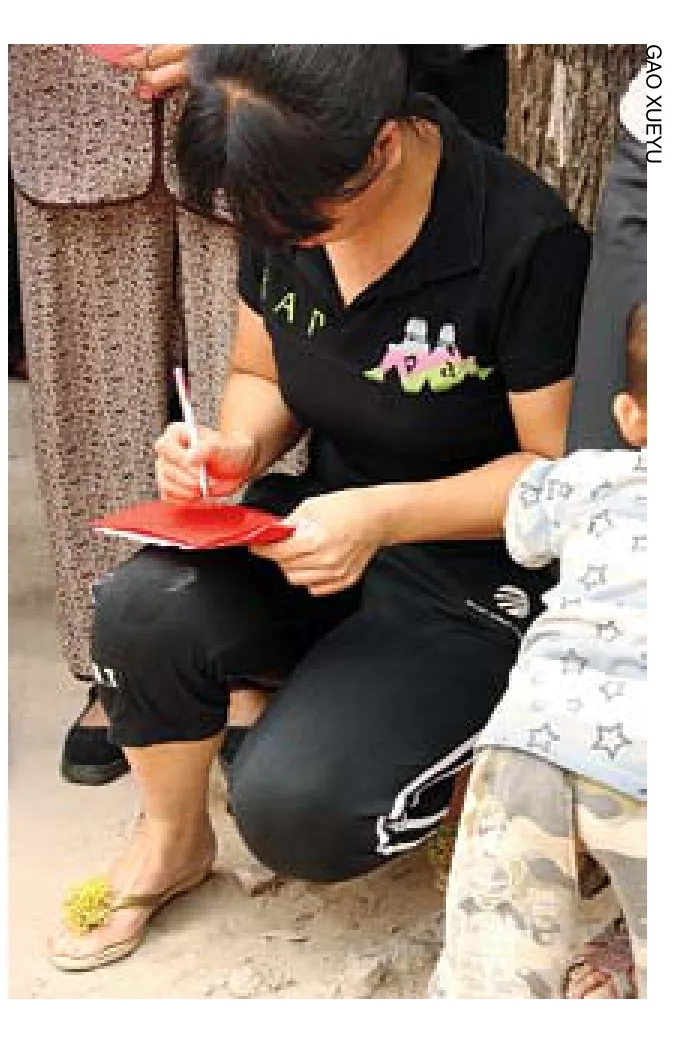
FILLING OUT BALLOT: A voter in Yeping Village in Ruijin City, central China’s Jiangxi Province, participates in local township election on June 24
In addition to face-to-face meetings, people can now get access to information regarding candidates using other means. The Financial Street Election Subcommittee of Beijing’s Xicheng District produced video clips for 58 candidates in 19 constituencies and put them online.
The 19 constituencies have 130,000 voters, 90 percent of whom are busy offce workers who may not have time to meet candidates face to face. With the video clips, voters can log onto the website of their constituencies and learn about candidates at any convenient time.
This novel way of communication was welcomed by Guo Hao, Assistant General Manager of the China Telecommunications Corp. This is the second time that Guo has run for a seat in the Xicheng District People’s Congress. Ten years ago, Guo was nominated but did not win the election.
He said that back then, there was little communication between voters and candidates.
“Now video clips and the Internet have made it easier to get your message, which means more people now have a chance of being elected purely on their own merit,” he said.
Voting on
The Electoral Law provides that names and other basic information of candidates for deputies of county- and township-level people’s congresses, including their age, party affliation, education and employment status, should be published seven days before the polling day.
On the first day of November, the four final candidates for deputies to Beijing’s Chaoyang District People’s Congress from the North Hujialou Neighborhood Constituency were announced.
The shortlist included Yin Jinfeng, a name familiar to local residents. Yin has worked as director of the neighborhood committee since 2000. In 2005, she was elected a national model worker, the only neighborhood committee director in Beijing to receive this honor that year. The neighborhood committee she heads has been rated as one of Beijing’s top neighborhood committees for 10 consecutive years. Since 2003, Yin has served two terms as a deputy to the Chaoyang District People’s Congress.
Many local residents said they had voted for Yin after casting their ballots on November 8.
“She is the most trustworthy person in this neighborhood,” said a senior citizen in his 80s. He said that Yin had given her phone number to elder people who live alone in the neighborhood and that she responded to their requests at any time.
“She also asked local schools to provide vocational training to more than 80 destitute people, and tried to fnd jobs for them,” said another voter.
In the eyes of many voters, Yin is someone who listens to their opinions, speaks for them and makes a genuine effort to solve their problems.
Li Lan, a resident in the neighborhood, provided an example. The neighborhood has nearly 300 licensed dogs. Some dog owners often failed to clean up after their dogs. Yin came up with an innovative solution to this chronic problem earlier this year.
Dog owners and other residents are encouraged to pick up dog poop and bring the excrement to a local collection center where it is turned into fertilizer. Residents who comply receive awards every four months.
Many voters said that in Yin, they saw the kind of role a people’s congress deputy can play. “A people’s congress deputy can really play an important role in improving the local neighborhood,” said Guo Yi, a senior resident.
Guo said that Yin helped make the more than 60-year-old neighborhood modern, clean and beautiful. An intercom system has been installed in all the local buildings to make them safer and hearings are held regularly on important issues in the neighborhood.
“More importantly, the neighborhood committee led by Yin helps vulnerable people, dissolves social conficts and sets up a mechanism to address pressing public concerns,” Guo said.
One of the other three people running for people’s congress seats in the North Hujialou Neighborhood Constituency works at China Central Television, the national broadcaster whose new office building is close to the neighborhood. Many voters supported him in hopes that he would attract more publicity to their neighborhood and its problems.
On November 15, the Election Offce of Beijing announced preliminary results of the polls held a week ago.
It said 9.1 million of 9.37 million registered voters cast their ballots, representing a turnout of 97 percent. They elected 4,349 deputies to people’s congresses of 16 counties and districts and 9,931 deputies to people’s congresses at township level. Fifty-four migrants got seats in county- and district-level people’s congresses and four in township-level people’s congresses.
